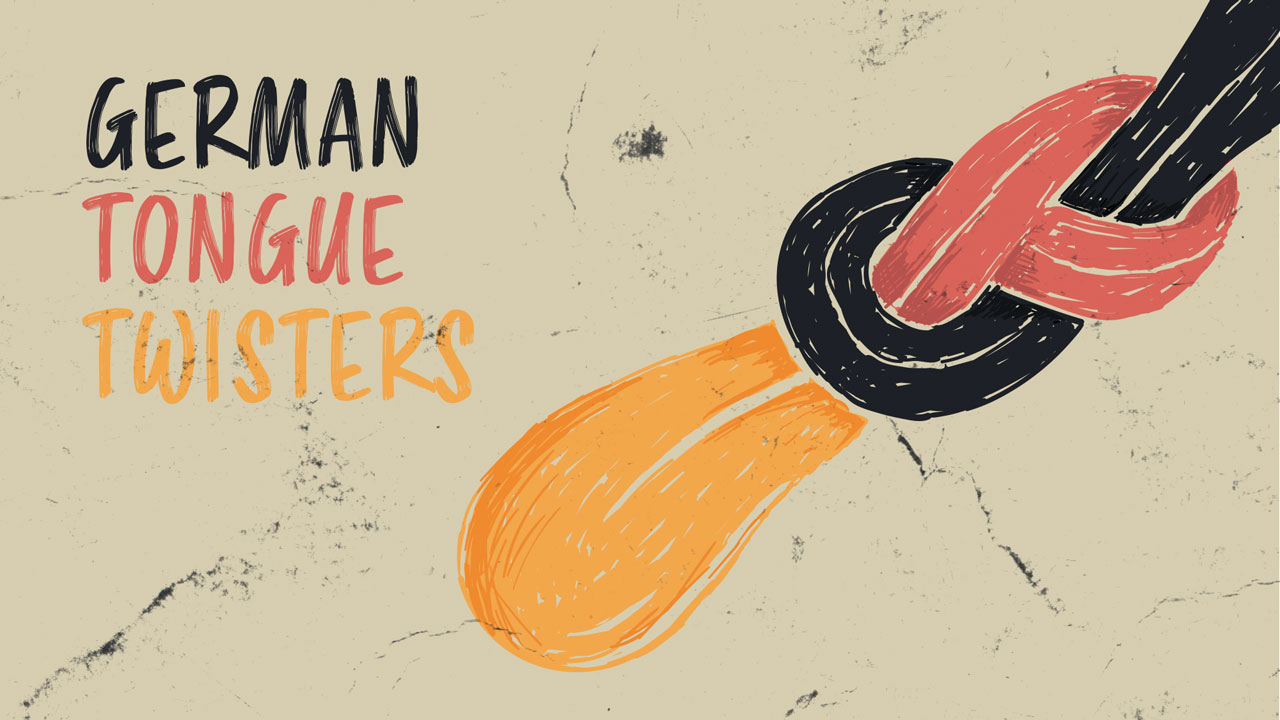20 German Tongue Twisters to Help You Master Speaking German
There are so many tools and language hacks to help you learn German quickly and with ease. One of these is to master pronunciation with German tongue twisters.
You can find German tongue twisters or deutsche Zungenbrecher in different forms and German dialects. All you need to start practicing are the sounds, words and letters giving you trouble.
Table of contents
- Why Study German Tongue Twisters
- Most Popular German Tongue Twisters
- 1 – Blaukraut bleibt Blaukraut und Brautkleid bleibt Brautkleid.
- 2 – Fischers Fritze fischt frische Fische.
- 3 – Schnecken erschrecken, wenn sie an Schnecken schlecken, weil zum Schrecken vieler Schnecken Schnecken nicht schmecken.
- 4 – Am zehnten Zehnten, zehn Uhr zehn zogen zehn zahme Ziegen zehn Zentner Zucker zum Zoo.
- German Tongue Twisters for Umlauts, R and CH
- 5 – Die ältere Schwester kam im März spät mit einem Käsekorb nach Hause und fand in der Nähe einen Bären.
- 6 – Die zwölf österreichischen Vögel versteckten den schönen Löffel des Königs in Kölns höchstem Baum.
- 7 – Herr Lücke ging über eine Brücke, sah eine Mücke und nahm seine Krücke, um sie zu schlagen.
- 8 – Rasent rasantes Rumpelstilzchen ruppelt Rolos rauf und runter.
- 9 – Aldrichs Tochter besuchte gern die Kirche am Bach und las Bücher.
- Easy German Tongue Twisters
- 10 – Violett steht ihr recht nett, recht nett steht ihr violett.
- 11 – Kleine Kinder können keine Kirschkerne knacken.
- 12 – Der Mondschein schien schon schön.
- Hard German Tongue Twisters
- 13 – Ein Dutzend nuschelnde Dutzer dutzen nuschelnd dutzende dutzender Nuschler nuschelnd.
- 14 – Klitzekleine Katzen kotzen klitzekleine Kotze. Klitzekleine Kotze kotzen klitzekleine Katzen.
- 15 – Sie stellte das Tschechische Streichholzschächtelchen auf den Tisch, auf den Tisch stellte sie das Tschechische Streichholzschächtelchen.
- German Tongue Twisters for Different Dialects
- 16 – Z Schwyz am Ziit schiind d Sunne, und schiind si nid z Schwyz, so schiind si z Brunne.
- 17 – Vena laus amoris, pax, druxun goris.
- 18 – S´Vuchtlond is do wo de Hasn Hosn un de Hosn Husn haßen.
- 19 – Zwischen zwa Zwetschgenzweigerln sitzen zwei Zeiserln.
- 20 – Moischt, mascht Moscht? Moscht muasch ma mega!
Why Study German Tongue Twisters
One of the first steps to learning a new language is hearing and voicing the new sounds of your target language. In German, English-speakers usually find ä, ü, ö, r, and ch to be difficult. When you begin learning German, you might doubt you’ll ever be able to make and combine these new sounds together without extra thought. But have no fear!
Therapists and educators use Deutsche Zungenbrecher, directly translated to “German tongue-breakers,” in classrooms and clinics to practice pronunciation.
Using themed tongue twisters, such as seasons or animals, can also help you build your vocabulary.
Last, using sound-specific tongue twisters can help train your ear and tongue to pronounce sounds that aren’t used in your native language.
Most Popular German Tongue Twisters
In both English and German, some tongue twisters are more known than others. In English, the most popular is “Peter Piper picked a peck of pickled peppers.” The German language also has its classic and widely known Zungenbrecher.
1 – Blaukraut bleibt Blaukraut und Brautkleid bleibt Brautkleid.
“Blue cabbage remains blue cabbage, and a wedding dress remains a wedding dress.”
2 – Fischers Fritze fischt frische Fische.
“Fisher’s pal fishes fresh fish.”
There is also a longer version – Fischers Fritz fischt frische Fische, frische Fische fischt Fischers Fritz.
3 – Schnecken erschrecken, wenn sie an Schnecken schlecken, weil zum Schrecken vieler Schnecken Schnecken nicht schmecken.
“Snails are startled when they lick snails because snails don’t taste good to the horror of many snails.”
4 – Am zehnten Zehnten, zehn Uhr zehn zogen zehn zahme Ziegen zehn Zentner Zucker zum Zoo.
“On the tenth Tenth, at 10:10, ten tame goats moved ten quintals of sugar to the zoo.”
German Tongue Twisters for Umlauts, R and CH
The English language doesn’t use umlauts – the dots above the German vowels a, o and u. The dots tell you to add an “eh” sound when you pronounce the normal vowel.
- A + E = Ä
- O + E = Ö
- U + E = Ü
The English language rarely uses the hard “ch” sound as in the English word “loch” or the German word Bauch. English also doesn’t use the soft “ch” sound as in the Standard German words Kirche or Bücher. Last, English uses a different “r” sound.
For speakers of multiple languages, many German sounds may be already familiar to you, because one of your languages uses it too. All you have to do is transfer your sound knowledge from your language to your target language and then focus on any new sounds.
For example, it took me years to realize that the Welsh “LL” sound is similar to the High German soft “ch” sound. It’s not exactly the same, but even a little bit goes a long way. Low German dialects have mostly kept the hard “ch” for every word. In Chur, Switzerland, you’ll hear even the German word ich with the “ch” sounding similar to the “ch” in Bauch.
By using sound-specific German tongue twisters, you can target whichever sounds you find hard to pronounce and practice them to perfection. Below are tongue twisters that focus on sounds frequently difficult for English-speakers.
5 – Die ältere Schwester kam im März spät mit einem Käsekorb nach Hause und fand in der Nähe einen Bären.
“The older sister came home late with a basket of cheese in March and found a bear closeby.”
6 – Die zwölf österreichischen Vögel versteckten den schönen Löffel des Königs in Kölns höchstem Baum.
“The twelve Austrian birds hid the king’s beautiful spoon in Köln’s highest tree.”
7 – Herr Lücke ging über eine Brücke, sah eine Mücke und nahm seine Krücke, um sie zu schlagen.
“Mr. Lücke went over a bridge, saw a mosquito and took his crutch to hit it.”
This is a shortened version of the long German tongue twister given below:
Herr und Frau Lücke gingen über eine Brücke. Da kam eine Mücke und stach Frau Lücke ins Genicke. Da nahm Herr Lücke seine Krücke und schlug Frau Lücke ins Genicke. Weswegen dann Frau Lücke mit der Mücke und der Krücke im Genicke tot umfiel.
“Mr. and Mrs. Lücke went over a bridge. Then, a mosquito came and stabbed Frau Lücke in the neck. Then, Mr. Lücke took his crutch and slapped Ms. Lücke in the neck. Which is why Ms. Lücke then, with the mosquito and the crutch in the neck, fell dead.”
8 – Rasent rasantes Rumpelstilzchen ruppelt Rolos rauf und runter.
“Furios, fast Rumpelstitskin rumbled (Venetian) blinds up and down.”
Here das Rolo is a Venetian window blind that rolls up and down. It’s nowadays more commonly called die Jalousie.
9 – Aldrichs Tochter besuchte gern die Kirche am Bach und las Bücher.
“Aldrich’s daughter liked to visit the church by the stream and read books.”
This one will let you practice switching between the two High German “ch” sounds.
- Hard “ch” (as in the English word “loch”) – Aldrich, Tochter, Besuchte, Bach
- Soft “ch” (as in the Welsh letter “LL”) – Kirche, Bücher
Easy German Tongue Twisters
German and English share a lot of the same sounds thanks to their common heritage as Germanic languages. Find out why learning German is simple for English-speakers here. Easy German tongue twisters highlight this feature in simple, short sentences.
10 – Violett steht ihr recht nett, recht nett steht ihr violett.
“Purple suits her quite nicely, quite nicely suits her purple.”
11 – Kleine Kinder können keine Kirschkerne knacken.
“Small children can crack no cherry stones.”
12 – Der Mondschein schien schon schön.
“The moonlight shines beautifully already.”
Hard German Tongue Twisters
The German language can combine smaller words to form longer words. Hard German tongue twisters take advantage of vocabulary building and repetitive sound combinations.
13 – Ein Dutzend nuschelnde Dutzer dutzen nuschelnd dutzende dutzender Nuschler nuschelnd.
“A dozen of mumbling “du-sayers” + ‘addressed as du’ + mumbling dozens of dozens + of mumblers mumbling.
The modern day form of dutzen is duzen, which means “to address someone as du.” The verb for mumbling is also nuscheln now.
14 – Klitzekleine Katzen kotzen klitzekleine Kotze. Klitzekleine Kotze kotzen klitzekleine Katzen.
“Teeny-weeny cats throw up teeny-weeny woolen blankets. Teeny-weeny woolen blankets throw up teeny-weeny cats.”
15 – Sie stellte das Tschechische Streichholzschächtelchen auf den Tisch, auf den Tisch stellte sie das Tschechische Streichholzschächtelchen.
“She placed the Czech matchbox on the table, on the table, she placed the Czech matchbox.”
If you need more help with standard High German pronunciation, then I recommend finding a native German-speaker to mimic, or using Rocket Language’s audio and voice recognition feature to hone your sound recognition skills.
German Tongue Twisters for Different Dialects
Like other widely spoken languages, German has many dialects. Linguists generally agree on 16 different dialect groups with as many as 250 individual dialects. For example, many different dialects are lumped together as Swiss German. However, the German spoken in Bern is different from the German spoken in Appenzell, because these different dialects are classified into one dialect group.
Most German dialects look the same as standard German when written down. Sometimes, people will write them differently to stress the pronunciation. For example, I will spell it Schwyz instead of Schweiz this time, so you know that the “ei” is pronounced as “ii” in the tongue twister below.
16 – Z Schwyz am Ziit schiind d Sunne, und schiind si nid z Schwyz, so schiind si z Brunne.
Swiss German (Schweizerdeutsch)
“In Switzerland, the sun shines at the church clock, and it does not shine in Switzerland like it shines in Brunnen.”
Standard German: In der Schweiz scheint die Sonne an der Kirchenuhr und scheint sie nicht in der Schweiz, so scheint sie in Brunnen.
17 – Vena laus amoris, pax, druxun goris.
Bavarian (Bayerisch)
“When there is a louse on the ear, grab it, press it, and it’s done.”
Standard German: Wenn eine Laus am Ohr ist, pack sie, drücke sie, und gar ist’s.
18 – S´Vuchtlond is do wo de Hasn Hosn un de Hosn Husn haßen.
Upper Saxon (Sächsisch)
“The Vogtland lies there, where the rabbits [are called] pants and the pants are called houses.”
Standard German: Das Vogtland liegt dort, wo die Hasen Hosen und die Hosen Husen heißen.
19 – Zwischen zwa Zwetschgenzweigerln sitzen zwei Zeiserln.
Viennese (Wienerisch)
“Two siskins (small songbirds) sit between two branches of the plum.”
Standard German: Zwischen zwei Zwetschgenzweigen sitzen zwei Zeisige.
20 – Moischt, mascht Moscht? Moscht muasch ma mega!
Schwäbisch
“Do you think you like must (a fruit juice)? You must like must!”
Standard German: Meinst Du, Du magst Most? Most muss man mögen!
Zungenbrecher in standard High German. Tungenbrekers in Low Saxon German. No matter the dialect, it’s clear that German-speakers love tongue twisters. Searching up Zungenbrecher nach Dialekt will give you German tongue twisters to find the sounds and dialect you need.
To start, Sprachnudel gives you 449 Tongue Twisters sorted in alphabetical order and categorized by difficulty. Which tongue twister is your favorite?









Social